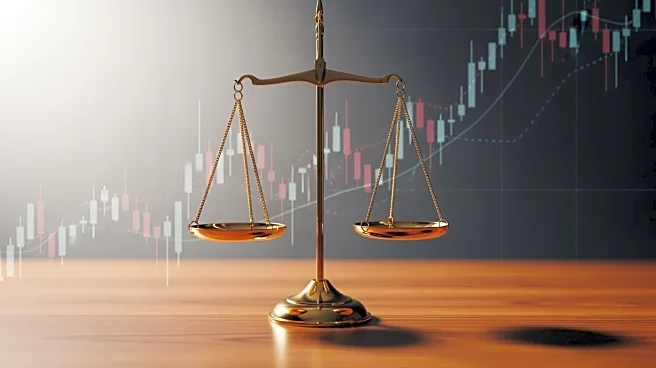What's Happening?
Americans have reached a record high in stock ownership, with stocks accounting for 45% of U.S. households' financial assets in the second quarter, according to Federal Reserve data. This milestone is driven
by record-high stock values, increased direct participation in the stock market, and the popularity of retirement plans like 401(k)s. While this allows more people to benefit from corporate gains, it also exposes them to potential market downturns. The S&P 500 has seen significant gains, fueled by the AI boom and major tech companies like Nvidia, Amazon, and Apple. However, economists warn that the high level of stock ownership could lead to increased economic vulnerability.
Why It's Important?
The record level of stock ownership among Americans signifies a shift in economic influence, where the stock market plays a more significant role in the overall economy. This increased exposure means that any market fluctuations could have a more profound impact on personal finances, especially in an economy facing labor market challenges and persistent inflation. Economists caution that while the stock market is currently buoyant, the high concentration of equities poses risks, particularly if a downturn occurs. This situation could exacerbate economic disparities, as wealthier individuals benefit from stock gains while those reliant on employment face stagnation.
What's Next?
Economists predict that the S&P 500 will continue to rise in the near term, but they advise caution due to the high share of equities. The potential for a market slump could affect consumer spending, particularly among wealthier Americans who have been driving economic growth. If the stock market experiences a prolonged downturn, it could lead to reduced household spending and impact economic stability. Stakeholders, including financial analysts and policymakers, will likely monitor these developments closely to assess the broader economic implications.
Beyond the Headlines
The current economic landscape highlights a 'K-shaped economy,' where wealth disparities are growing. The stock market's influence on economic data can create a misleadingly positive picture, masking the struggles of lower-income Americans. This dynamic underscores the need for policies that address economic inequality and ensure that growth benefits a broader segment of the population.










